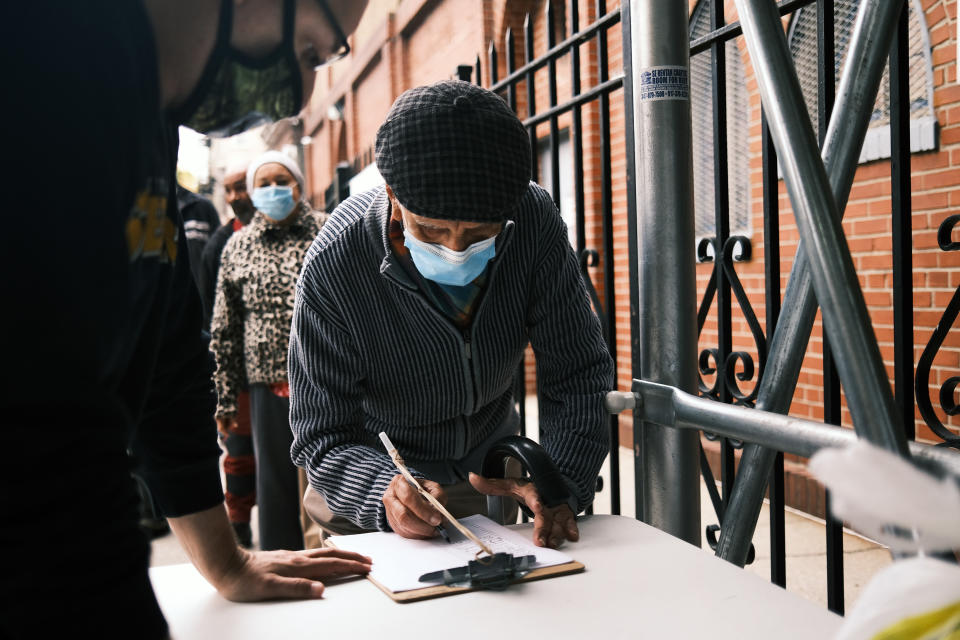Jobless claims: Another 742,000 Americans filed new unemployment claims last week
U.S. states saw another 742,000 Americans file for first-time unemployment benefits last week, as new jobless claims unexpectedly rose as COVID-19 cases in the U.S. keep marching higher.
The Department of Labor released its weekly report on new jobless claims Thursday morning at 8:30 a.m. ET. Here were the main results from the report, compared to consensus estimates compiled by Bloomberg:
Initial jobless claims, week ended Nov. 14: 742,000 vs. 700,000 expected and a revised 711,000 during prior week
Continuing claims, week ended Nov. 7: 6.372 million vs. 6.4 million expected and a revised 6.801 million during prior week
New unemployment claims held below the 1 million mark for a twelfth straight week. New claims also rose for the first time in five weeks, however, though they have moved steadily lower from a pandemic-era peak of nearly 7 million.
By state, Louisiana added by far the greatest number of new claims last week, with these rising by nearly 33,000 on an unadjusted basis to about 42,700. States including Massachusetts, Texas and Virginia each also saw notable increases. Illinois, on the other hand, saw new claims drop by more than 20,000, and each of Florida, New Jersey, and Washington state also posted notable declines in new claims.

Continuing jobless claims improved to the lowest level since mid-March, while still holding nearly four times above the 2019 average of 1.7 million continuing claims per week. But while continuing claims for state programs have trended lower, the number of Americans that have rolled off these regular state benefits and into longer-term unemployment programs has creeped up.
Based on Thursday’s report, more than 233,000 Americans were added to the Pandemic Emergency Unemployment Compensation program, which provides an additional 13 weeks of unemployment benefits. This marked an acceleration from the previous week. And across all programs, 20.3 million Americans were still claiming unemployment benefits of one kind or another, as the coronavirus pandemic continues to keep tens of millions out of work.
The labor market may also be harder-pressed to make further strides in recovering in the coming weeks and months, given that rising COVID-19 cases in the U.S. have already led to a renewed wave of lockdowns across the country. Daily new virus cases in the U.S. have averaged at more than 150,000 over the past seven days, for an increase of 80% from the average two weeks ago, according to New York Times data. And states including California, Oregon, Illinois and New Mexico have been among the most recent to impose harsher stay-in-place orders and business restrictions to try and rein in the virus’ spread.
“The story of the next few weeks will be a gradual and uneven—but unambiguous—tightening of anti-COVID restrictions across the country,” Ian Shepherdson, chief economist for Pantheon Macroeconomics, said in a note Sunday. “The rapid rate of growth of cases and infections threatens to overwhelm the hospital system by the end of the year, at which point current trends suggest that perhaps 250K people will be hospitalized with Covid, with about 60K in ICUs.”
“Politicians, therefore, will have no choice but to respond to the unfolding nightmare in hospitals,” he added. “They will restrict activity in the leisure and hospitality sector— perhaps closing bars and restaurants completely in the hardest-hit cities—and by limiting indoor gatherings, in homes and elsewhere. These measures work, but they exact a real cost on the economy.”
—
Emily McCormick is a reporter for Yahoo Finance. Follow her on Twitter: @emily_mcck
Read more from Emily:
Some wellness products growing ‘over 1,000%’ during pandemic: Ro CEO
What we can learn from the 17 stock market crashes since 1870
Find live stock market quotes and the latest business and finance news
For tutorials and information on investing and trading stocks, check out Cashay
Follow Yahoo Finance on Twitter, Facebook, Instagram, Flipboard, LinkedIn, and reddit.